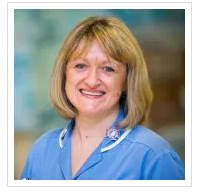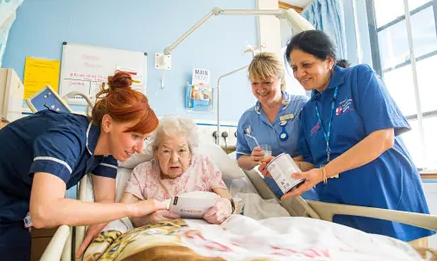May 14, 2021, by School of Medicine
30 at 30: Celebrating Nursing at Nottingham
 This year we celebrate 30 years of nurse training at University of Nottingham, although I have been working at NUH since before then. I started as a Staff Nurse in 1989 and have seen quite a few changes.
This year we celebrate 30 years of nurse training at University of Nottingham, although I have been working at NUH since before then. I started as a Staff Nurse in 1989 and have seen quite a few changes.
My education as a student nurse began in 1984 through the apprenticeship-style scheme. We worked as auxiliary nurses and learnt ‘on the job’; I remember wearing hats, belts, buckles, and hospital badges. Thankfully, the hats have gone but I still dig out my silver buckle to polish it occasionally and am pleased to see the Chief Nurse at NUH has advocated a contemporary hospital badge for NUH staff.
So, what changes have we seen in the last 30 years? The main one for me is an evidence-based approach to nursing care and more streamlined ways of working. Now, of course, nurses are educated at degree level and can study at masters and doctoral level. Patient and public involvement has seen their direct involvement at all levels of the healthcare process. Audits have made a difference as we can measure and monitor our activity.
However, there are calls from sections of the public towards moving back to an apprenticeship style system as some think it has made nurses uncaring and ‘too posh to wash’. I feel justified in commenting on this debate having seen both sides of the argument as a novice student nurse and having successfully defended my PhD thesis recen tly, but still feel ‘old school’. What is it about the nursing profession that attracts this debate? My question to the recalcitrant is ‘would the public accept a doctor or physio who was not educated to degree level’?
tly, but still feel ‘old school’. What is it about the nursing profession that attracts this debate? My question to the recalcitrant is ‘would the public accept a doctor or physio who was not educated to degree level’?
I still remember the frustration when nursing patients who needed complex care that our profession was not equipped with the knowledge, skills nor capability to deliver. We were, as a profession, simply not sufficiently evolved to this level. Nurses, in my experience, have always (on the whole) been caring and I certainly think that a good education does not rob them of that compassionate nature. My feeling is that the political influences that drive healthcare, leadership, workplace culture, the sheer pace and burden of workload (particularly acute in today’s Covid-19 era) are responsible for burnout and subsequent lack of compassion.
I have been fortunate to have had a rewarding career and the opportunity to be the best I can be by accessing ongoing education at the University of Nottingham. I am passionately defensive of nurse education and feel that it is the way forward to promote the profession and improve patient care. Now a nurse educator, I am happy to draw on my previous experiences. Only this week I managed to persuade an undergraduate nursing student of the value of evidence-based practice by describing how we nursed in the ‘80s – she was bemused by the concept of the ward’s communal electric razor which was unfortunately common practice in pre-HIV days.
The past 30 years have seen huge changes for me both personally and across nurse education, healthcare and, indeed, society; I wonder what the next 30 years will bring? One thing I am certain of is that the student nurses I meet are still caring, compassionate and keen to provide an excellent service to those in their care.
Liz Charalambous RN, BSc (Hons), MSc, PhD is a teaching associate at the school of health sciences, University of Nottingham. Having qualified in Yorkshire in 1987, she moved to Nottingham in 1989 and worked as a staff nurse. she now works as a nurse educator having studied at Nottingham while working clinically.
No comments yet, fill out a comment to be the first

Leave a Reply